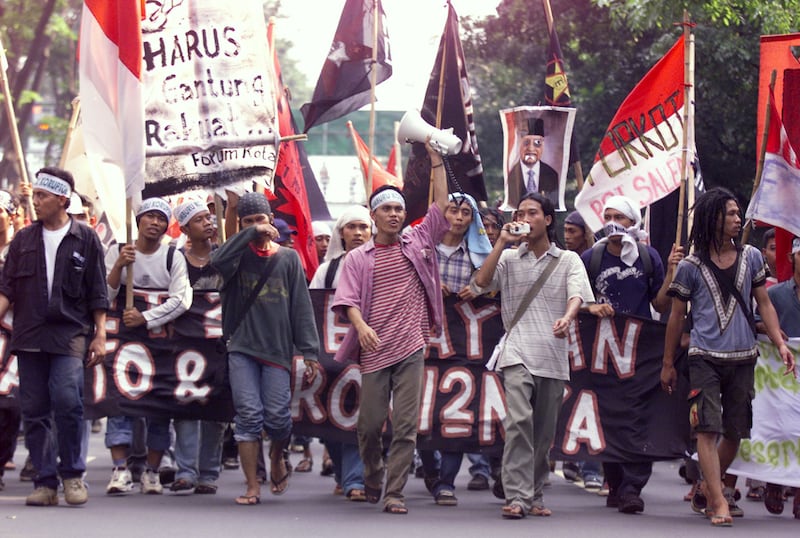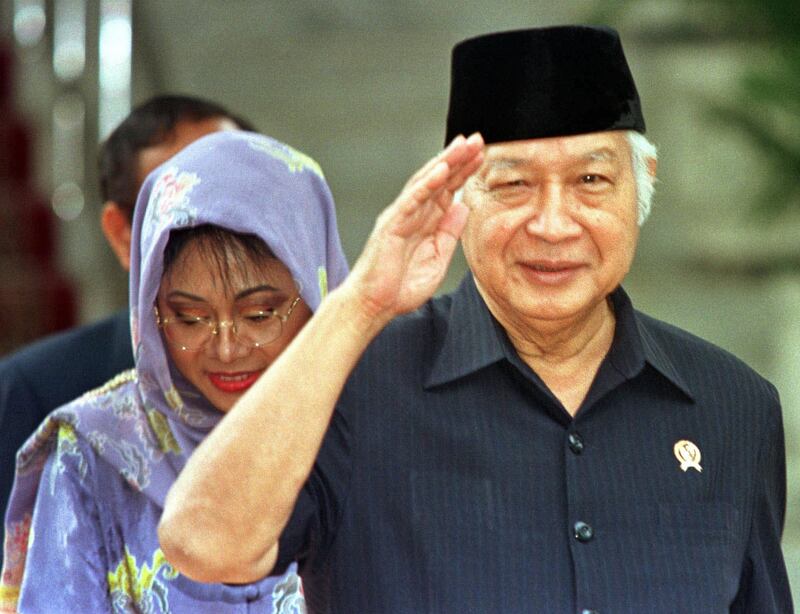As Indonesia prepares for next month’s presidential and legislative elections, a video that uses artificial intelligence to resurrect the image and voice of the late longtime dictator Suharto has sparked a debate over the ethical and legal implications of using such technology for political campaigns.
The video, posted on social media Sunday by a politician from the Golkar Party, which was founded by Suharto, shows a lifelike simulation of the former president, wearing a batik shirt and urging voters to vote for Golkar candidates.
Suharto, a former army general, rose to power amid a bloodbath of nationwide turmoil in the mid-1960s and held power for 32 years before his fall in 1998 ushered in a new era of democracy in Southeast Asia’s largest country.
Some democracy and election activists called on the General Elections Commission (KPU) to regulate the use of artificial intelligence in campaigning, saying this technology could threaten the integrity and fairness of the electoral process.
“I am President Suharto, the second president of Indonesia, inviting you to elect representatives of the people from Golkar,” the digital Suharto says in the video, which was posted on Instagram and X by Erwin Aksa, the party’s deputy chairman.
The video, which was created by the party, according to an Indonesian news report, has been viewed at least 4.5 million times on the social media platform since it was posted on Jan. 6.
Indonesia, the world's third-largest democracy and fourth-most populous country, will hold its general election on Feb. 14 to elect the president, vice president, and members of the national and regional legislatures.
The video “shows that AI can be a tool of unlimited political propaganda that, if not regulated, could potentially violate legal and ethical boundaries,” said Gugum Ridho Putra, the coordinator of Concerned Team for Election Advocacy, an NGO.
“AI could be used in a deviant way, to manipulate and mislead voters,” he told BenarNews.
Suharto, who died in 2008, is a controversial figure in Indonesian history. Under his authoritarian regime, human rights abuses, corruption and nepotism were rampant.
Suharto took over from President Sukarno, the country’s founding leader, after a failed coup attempt blamed on the Indonesian Communist Party (PKI) in 1965. Historians estimate between 200,000 and 800,000 Indonesians died in a government-sponsored anti-communist purge between 1965 and 1966.
Suharto is also credited with bringing economic development, stability and national unity to the diverse archipelago.He resigned in 1998 amid political and economic upheaval following the Asian financial crisis of 1997.

The election commission has not yet issued any rules on the use of AI in campaigning, but it had issued some guidelines and codes of conduct for online campaigning, such as prohibiting the use of hate speech, defamation, and false information.
The presidential race next month is a three-way contest between Defense Minister Prabowo Subianto – Suharto's former son-in-law – former Jakarta Gov. Anies Baswedan and former Central Java Gov. Ganjar Pranowo.
‘You have crossed the line’
Some X users criticized Erwin for using the image of the late president.
“Reviving a person who is long dead using AI technology to give a speech supporting Golkar. Where are your morality and ethics?” @mashazairin wrote.
“This is a mess. You have crossed the line. This is clearly a lie. Your candidates’ image will get worse because of this excessive use of AI,” said another X user, @akuluthfi.
The Suharto video was created using a technique known as deepfake, which uses artificial intelligence to manipulate images and audio to create realistic but fake content.
The technology has been used for various purposes, from entertainment to misinformation, and has raised concerns about its potential to deceive and influence public opinion.
Late last year, a video that used artificial intelligence to make Indonesian President Joko “Jokowi” Widodo speak Mandarin stirred up social media late last year.
The use of AI in campaigns for next month’s elections has not been limited to the Golkar Party.
The Prabowo team has also used AI to create visual images for its campaign materials, including depictions of him and his running mate Gibran Rakabuming Raka as cute youngsters on billboards and television ads.

Experts said the rise of deepfake technology poses a challenge for journalists and fact-checkers, who have to verify the authenticity and accuracy of the content they report. Some have suggested the use of digital watermarking, blockchain, and artificial intelligence itself to detect and counter deepfake.
Jeirry Sumampow, Indonesian Voters Committee coordinator, said the details of what is prohibited with AI should be clarified.
“Whether it’s OK to use images that talk and move, whether it’s OK to use figures who have died, that needs to be discussed further,” he told BenarNews.
The Ministry of Communication and Information Technology circulated a letter on the ethics of using artificial intelligence in late December, but it was only advisory.
Nurul Amalia, a researcher at the Association for Elections and Democracy, said she and her group had suggested the commission and the election supervisory agency jointly lay down some ground rules for social media campaigning, especially the use of artificial intelligence by candidates.
“We proposed [that campaigns] give a disclaimer for any content made with AI,” Nurul said.
One analyst said the election campaigns – until this Suharto video – for next month’s elections had been free of misinformation propagated through artificial intelligence.
“The use of AI in the current election season is still reasonable,” Wasisto Raharjo Djati, a political researcher at the National Research and Innovation Agency, told BenarNews.
“But we will need special regulations for what content can be shown in the future.”
